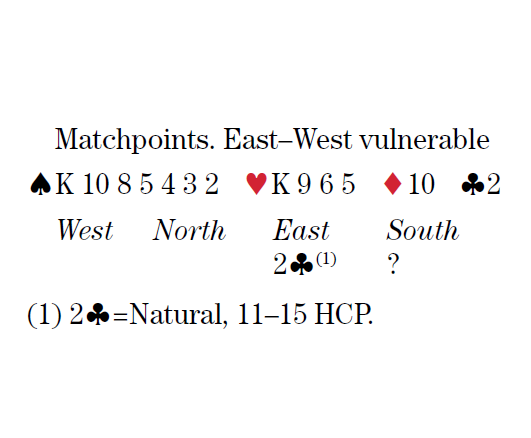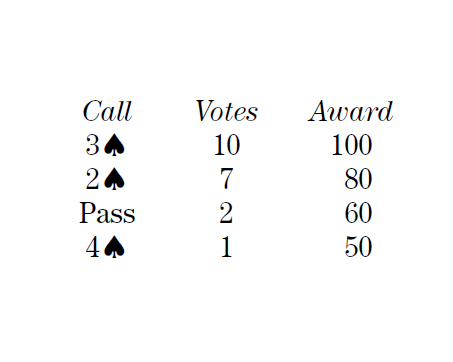
What’s your call?
| 2♦ | 2♥ | 2♠ | 2NT | |
| 3♣ | 3♦ | 3♥ | 3♠ | 3NT |
| 4♣ | 4♦ | 4♥ | 4♠ | 4NT |
| 5♣ | 5♦ | 5♥ | 5♠ | 5NT |
| 6♣ | 6♦ | 6♥ | 6♠ | 6NT |
| 7♣ | 7♦ | 7♥ | 7♠ | 7NT |
| Dbl | Pass |
Partnership agreement required
“Although 3♠ is an unusual preempt,” explain the Joyces, “it makes sense to us that a jump in a new suit over a value-showing bid would be preemptive. Although our cards are not ideal, the shape is great!”
“3♠,” says Boehm, “a weak jump overcall — like 1♣–3♠. Imperfect, but 2♠ seems more dangerous because in a competitive auction, partner will play me for much more defense.”
“Since they have not preempted, I am still allowed to preempt,” says 3♠ bidder Hampson. “I like the 7–4 pattern, but the holes in my suit are too large to allow me to gamble 4♠ by myself.”
Rigal’s rationale: “Over weak twos, a jump to 3♠ would be strong. Over an opening bid, this should be weak. Some would bid 4♠ I suppose, but that looks too much like a transfer to minus 500.”
Isfeld and Henneberger evaluate: “The favorable vulnerability combined with 7–4 shape make up for the lack of suit quality.”
“3♠,” according to Walker, “the same bid I would have made over any other opening bid.”
Lawrence is content with 2♠, “mainly because passing may make it too dangerous to bid later. This hand has terrific shape to compensate for its weak values. Because 2♣ is an opening hand, 3♠ here would show a preemptive hand.”
Robinson’s evaluation standards are similar. “I know 2♠ shows an opening bid, but this looks like a good hand.”
Unsure of what 3♠ would be, Slack tries 2♠. “The person with shortness should stretch to get into the auction, and this is about as much as I want to stretch.”
“2♠,” offers Colchamiro. “It’s not in my DNA to pass, and 3♠ is obviously wrong and 4♠ is a bit much for me.”
“I would like to preempt,” says Cohen,who bids 2♠. “But it isn’t clear without discussion if 3♠ would be intermediate or weak. This isn’t defined in most people’s system notes.”
“We have playing strength to bid and it seems better to go slow and hope to get hearts into the picture,” say the Sutherlins with 2♠.
Falk passes. “With a bad spade suit and four biddable hearts, I can wait before committing us to a level and strain my high cards do not justify. If I bid spades later at the three level, partner will know I have hearts. With spades only, I’d bid now.”
Sanborn passes and prays. “It would have been easier to bid over 1♣, but after 2♣, any number of spades I bid will show more strength than I have. I hate passing, but my poor partner will hate me if I bid.”
The Coopers go high. “4♠. We are disadvantaged compared to the field that opened 1♣, so we use the maximum room we can.”

